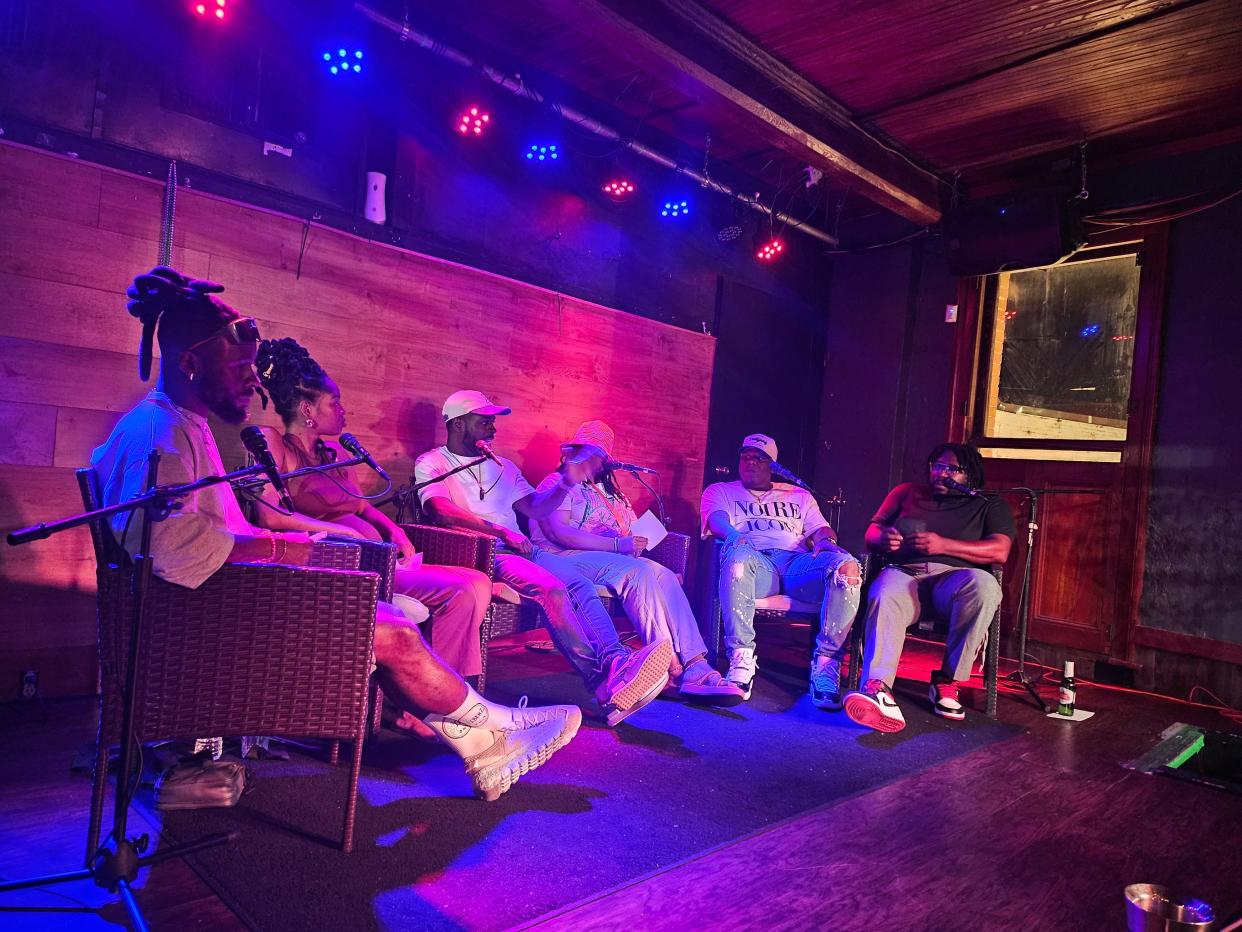Houma podcast discusses drug culture in Black community with narcotics agent, pharmacist
A Houma-based podcast discussed drug culture with a narcotics agent and a dispensary pharmacist.
The Conveaux Club, a Houma-based podcast that records twice a month at the Balcony in downtown Houma, discussed alcohol, vapes, marijuana and regulation during a recording April 25. It had a pharmacist and a narcotics officer as guests. They talked about why people get into the substances and the differences between helping and enabling.
From the availability of alcohol at gas stations to the existence of drive-thru daiquiri shops, Louisiana is culturally accepting of drug usage, the hosts of the podcast said.
"It's a part of our culture, you know, you have a barbeque or a party, what are you bringin,'" Darryl Rhines said. "Somebody pullin' up with a handle of Crown or Hennessy, so I think that growin' up in Louisiana definitely put a lot of us on alcohol."

The Conveaux Club is a collaboration between Darryl Rhines, Travion Smith, Nek Harris, Samuel Rhines and Mikia Jackson. The first episode aired Oct. 6, 2023. They have covered topics such as music, sex, racism, social media and more. The podcast is recorded live, and the audience participates in the discussion. This episode had about 10 people watch the live recording.
Houma Police Department Narcotics Officer Roy Williams was a guest on the show and discussed topics ranging from vape pens to the prevalence of fentanyl. He said his own family struggled with drugs, and it's taught him to treat addicts with dignity.
"Some people, they have a traumatic experience," he said. "Some people go through a bad breakup or divorce or whatever, lose their family. So the best thing to do is to try to show support for them."
Enabling versus support
When asked how to help someone who has an addiction, he explained that addiction is a lifelong struggle, and there's a difference between helping and enabling. Williams said to avoid giving the addict money; instead, give them food, a haircut, a fresh set of clothes, and then take them to a job convention.
The key, he said, was to look past the addiction to the underlying problem that is driving the person to use the substance. The drug abuse is a symptom of a greater problem, not the illness, he said.
"You have to find that nexus," he said. "Like what's causing, what's driving them to it. I understand it's a sickness and it's an addiction, but what's driving them to it? What's botherin' them so much that they have to resort to that? And try to attack that problem and help them head-on to resolve that issue."
In his experience, he said, it's better to try to help the person in private than to air their struggle to the public.
Vapes
Vapes are difficult for law enforcement to deal with, Williams said, because they are difficult for the untrained eye to notice because they are made to look like highlighters, ink pens, jump drives and other unassuming items. Not only the exterior is made to avoid detection, but manufacturers are producing the chemicals inside it to avoid prosecution. Williams said up to a certain amount of THC is leagally allowed inside the vapes. THC, or tetrahydrocannabinol, is the psychoactive compound in marijuana that gets a consumer high.
Co-host Jackson, 27, is a school teacher, and she said the vapes are prevalent in the schools. She said kids as young as fifth-graders are being caught with them.
"They put vapes in Ziploc bags and puttin' them in the toilet tops and lettin' them float, or are standing on the top of the toilet and putting them in the ceiling tiles and going to get them at lunch," she said.
More: Eviction looms: Louisiana aids Hurricane Ida survivors, but housing still hard to secure
More: Chauvin community gathers to celebrate its past, faces uncertain future
Marijuana
Green Leaf Dispensary Pharmacist Torri Thomas was asked about the varieties of marijuana and how they work. According to Thomas the strain Stateva helps with depression, ADHD, and, in her words, works as a "pick-me-up."
"Day time weed," Samuel Rhines said.
Thomas said the Indica strain is the opposite. It helps to relax the body, helps the person sleep,
"When we say Indica we think of in-da-couch," she said.
The level of regulation around medical marijuana is only as good as the doctors prescribing it, she said. To enter one of Louisiana's 10 licensed dispensaries, a person must call ahead and have proper paperwork. However, doctors vary in how strictly the prescribing marijuana, she said.
The doctors have "open" and "closed" recommendations. The open recommendations allow the patient to shop at their leisure and buy whatever strain they see fit. The closed recommendation prescribes a very specific purchase.
"If you're already on Norco or Percocet or something like that, then they'll be specific," she said.
This article originally appeared on The Courier: Houma podcast discusses drug culture with narcotics agent, pharmacist
